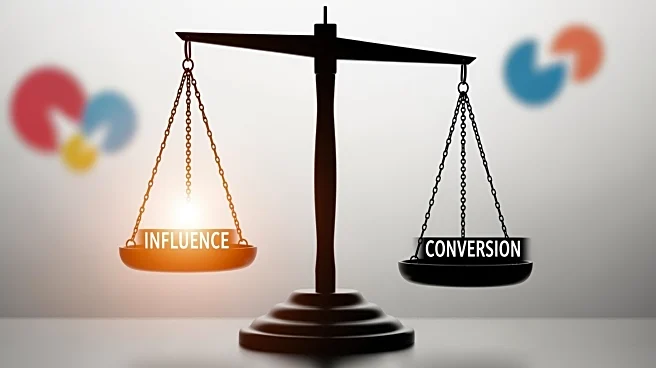What's Happening?
B2B marketers are increasingly shifting their lead generation strategies from traditional conversion-focused methods to influence-driven approaches. This change is driven by the need to build deeper relationships
with clients and create value throughout the customer journey. According to Marketing Week's 2025 State of B2B Marketing research, 70% of B2B marketers have prioritized lead generation over the past three years, with a significant focus on data-driven insights and personalized content. Companies like Canva and EY are leading this transformation by utilizing AI and personalized video content to engage clients effectively. The shift is also evident in the use of employees as influencers to raise brand awareness, aligning with the growing emphasis on trust and long-term partnerships.
Why It's Important?
The shift from conversion to influence in B2B marketing is significant as it reflects a broader trend towards personalization and relationship-building in business strategies. This approach can lead to more sustainable growth by fostering trust and loyalty among clients, which is crucial in industries with long sales cycles. By focusing on influence, marketers can ensure their brands remain top-of-mind when clients are ready to make purchasing decisions. This strategy also aligns with the increasing importance of social media and content marketing in driving engagement, offering businesses a competitive edge in attracting and retaining high-value accounts.
What's Next?
As B2B marketers continue to embrace influence-driven strategies, we can expect further integration of AI and data analytics to enhance personalization and engagement. Companies may invest more in training and tools to bridge the skills gap in AI, ensuring their teams can effectively manage these technologies. Additionally, the focus on building trust and long-term relationships may lead to more collaborative efforts between marketing and sales teams, emphasizing transparency and shared goals. This evolution could redefine success metrics in B2B marketing, prioritizing quality of engagement over traditional conversion rates.
Beyond the Headlines
The shift towards influence in B2B marketing may have ethical implications, particularly in how companies use data to personalize content and engage clients. As AI becomes more prevalent, marketers must navigate privacy concerns and ensure their strategies align with ethical standards. Furthermore, the emphasis on relationship-building could lead to cultural shifts within organizations, fostering environments that prioritize collaboration and shared values. This approach may also influence how businesses interact with their communities, potentially leading to more socially responsible marketing practices.










